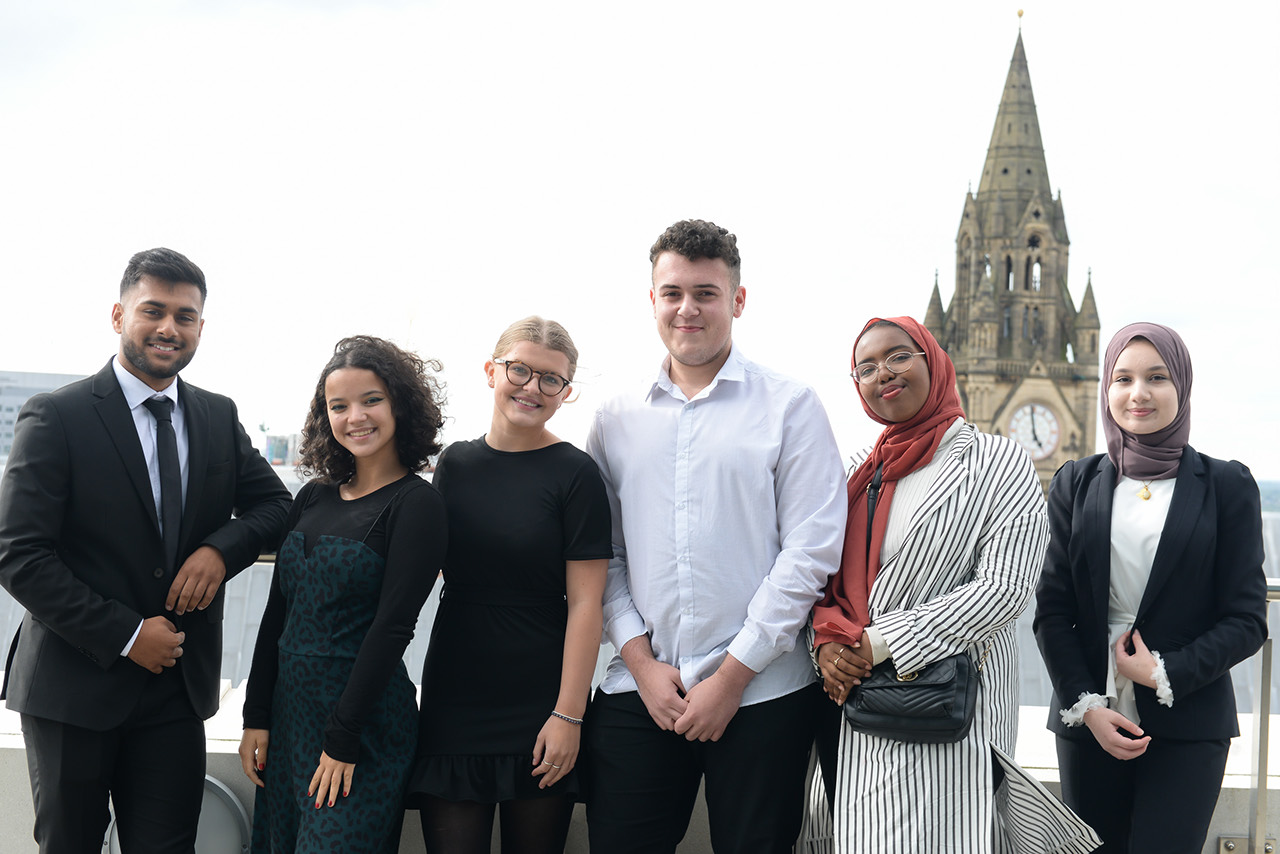The EY Foundation is a charitable company registered in England and Wales and Scotland with registered charity number 1157154 and SC045076. It is also a member firm of Ernst & Young Global Limited

Huma, an EY Foundation programme graduate and ambassador, was a panelist at our Future of Work event. Here, she shares reflections on key discussions points and the impact changes in technology might have on the world of work she is going to enter.
Earlier this year, EY Foundation’s Youth Advisory Board (YAB) hosted an event for young people, employers, and technology experts to explore the future of work. Following an introduction from the YAB and a panel discussion, attendees broke into roundtables facilitated by young people to share insight, reactions and questions. The lively discussions covered the barriers young people from low-income backgrounds currently face, the ways technology may change the landscape of the future, and the opportunities and barriers that may result.
Existing challenges
Before looking to the future of work, the first takeaway from speaking to young people was that challenges to entering employment are not new. It’s not unusual to see people disregarding opportunities they don’t feel are ‘for them’, and young people may also feel that employers are too focused on only communicating when they ‘need you’ in the recruitment process; for example, only getting in touch with a candidate when they need extra information rather than answering their questions or sharing additional support ahead of an interview. This fueled a feeling that employers need to do more to demonstrate the accessibility of careers.
For those young people who had been successful in entering the world of professional work, they emphasized how a sense of belonging is crucial. Many recounted feelings of not ‘fitting in’ initially, whilst others commended employers' efforts in creating workplace communities and fostering collaboration across teams and locations. The workplace often felt intimidating from the outside, highlighting the need for a conscious effort from employers to break down this barrier.
Addressing challenges through technology
Whilst there was unanimous consensus from attendees that barriers to meaningful employment still exist, there was optimism about the opportunities for technology to overcome these obstacles.
Social media, especially the prevalence of ‘day in the life’ content, was seen as a window into the world of work. The chance to learn new skills through platforms such as YouTube and online short courses were seen as key tools in addressing gaps in information from formal networks that young people from low-income backgrounds may not have access to.
Emerging technology was seen as a way to advance the opportunities for young people to engage with careers-related learning. One technology expert referred to how new technologies like Generative Artificial Intelligence (Gen AI) could be used to provide an easy tailorable approach to careers education, providing those who may not have access to networks of professionals the same information as those with industry connections.
Employers also referenced how technologies like virtual reality could ease the burden of providing in-depth work experience, in ways tools like video calls have struggled to replicate.
Approach new tech with caution
AI was seen as being likely to have the same effect of the rise of the internet in creating jobs that didn’t previously exist. Whilst this was an exciting prospect for some, careers leaders were unsure of how this should impact employability programmes.
Young people also reiterated the problem of answering the question: what skills should I be learning if we don’t know what roles will be needed in the next 15 years? Discussions settled on one general rule of thumb: focus on what tech will struggle to replicate i.e., transferrable skills like problem-solving, communication and teamwork, which will be valued in all roles and sectors.
Perhaps inevitably, employers, young people and experts felt there were some key questions that remain unanswered:
What does the global nature of things like the Metaverse mean for young people already disadvantaged in the labour market as they compete for opportunities with a much bigger pool of global talent?
What does this technology mean for those who will struggle to access the right devices and connectivity? How can the work of organisations who help to ensure digital access be increased?
What does the automation of tasks most commonly completed by entry level employees mean for those starting out in their careers and trying to build their experience and skillset?
Recommendations
1. Focus on education: – this includes 1) education in how to use new technologies like AI and the Metaverse, and 2) how to ‘behave’ in this technology to ensure they can make the most of opportunities. Careers professionals also need educating on the future of work, to understand future proof skills and to ensure advice and training reflects the ever-changing list of careers created by emerging technology.
2. Bridge the gap between the theoretical and the practical: ensure discussions are focused on what is actually happening in the employment market and not what could happen. Young people can be disheartened by negative discourse such as ‘a robot is going to take your job’ and this rhetoric is not shared by employers. Focus on case studies and share practical experiences of how the workplace is changing.
3. Influence how technologies are developing: emerging technologies are just that, emerging, and so there is still the opportunity to influence the safeguarding and accountability mechanisms put in place. Where possible, organisations should ensure the concerns related to social mobility are fed into discussions on regulation and development.
EY Foundation are working to implement these recommendations. In the New Year they will be:
Introducing Artificial Intelligence training in their high-impact employability programmes.
Promoting the findings from their Social Mobility in the Metaverse report to ensure this technology develops in an inclusive way.
Exploring how emerging technologies can be used to reimagine careers-related learning, with a focus on work experience.
Stay in touch on LinkedIn to follow EY Foundation's work in this space.


